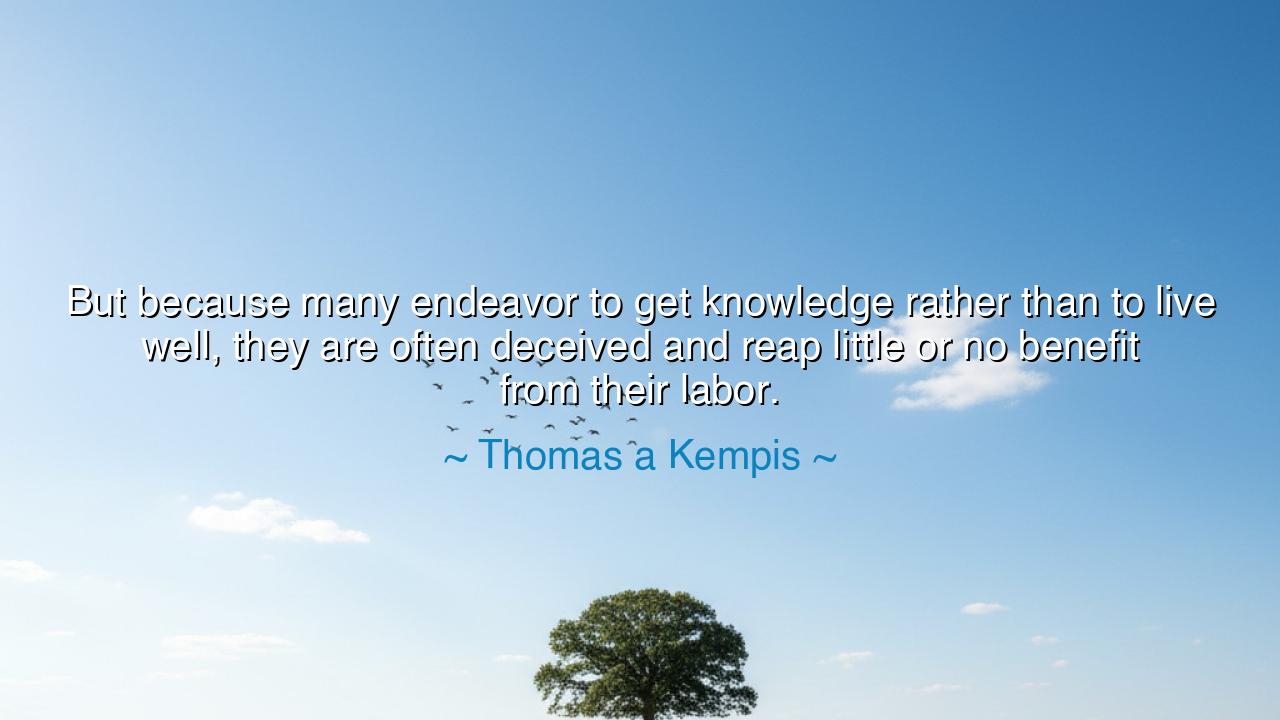
But because many endeavor to get knowledge rather than to live
But because many endeavor to get knowledge rather than to live well, they are often deceived and reap little or no benefit from their labor.






The words of Thomas à Kempis, the humble monk of the fifteenth century and author of The Imitation of Christ, shine like a lamp for all seekers of wisdom: “But because many endeavor to get knowledge rather than to live well, they are often deceived and reap little or no benefit from their labor.” In this saying, he reveals the eternal conflict between the mind’s hunger for learning and the soul’s need for virtue. To know much but to live poorly is to be as a tree rich in leaves but barren of fruit. True wisdom, he teaches, is not the possession of knowledge alone, but the transformation of life into goodness.
The origin of these words lies in the cloisters of medieval Europe, where Thomas observed both the scholars of his age and the monks within his order. Many sought learning for its own sake, filling their minds with disputations, arguments, and philosophies, but neglecting the deeper call to holiness, humility, and service. He saw clearly that knowledge without virtue is empty, and that the greatest folly of mankind is to mistake information for transformation. His counsel was simple: better to live well with little learning than to live poorly with great knowledge.
History bears witness to this truth. Consider the fall of Socrates’ accusers in Athens, men well-versed in rhetoric and debate, but lacking virtue. They condemned the philosopher to death, though he himself pursued not the accumulation of knowledge, but the examined life. Their knowledge brought no benefit, for it was corrupted by pride and power. Contrast this with Francis of Assisi, who had little scholarly learning, but who lived with purity, simplicity, and love. His life bore fruit that continues to nourish the world, proving Thomas’s principle: to live well is greater than to merely know.
We see the same truth in the story of the scribes and Pharisees in the Gospels. They knew the law in every detail, yet failed to embody its heart. Their knowledge became a snare, for it fed pride rather than compassion. Meanwhile, the unlearned fishermen who followed Christ transformed the world, not because they knew much, but because they learned to live well—to love, to forgive, to serve. Here is the difference between lifeless knowledge and living wisdom.
O children of tomorrow, understand this: knowledge is a tool, not an end. It is a lamp to guide the way, but not the destination itself. If you labor only to know, your reward will be emptiness. If you labor to live well, knowledge will serve you faithfully, becoming not pride’s crown but humility’s servant. Seek first the life of virtue, and let knowledge follow as handmaid to goodness. Then your learning will not deceive you, but will enrich your life and the lives of those around you.
The lesson is clear. Do not despise learning, but put it in its rightful place. Study not only to know, but to become. Let every truth you acquire find expression in your deeds. Ask yourself not only, “What have I learned?” but “How does this help me to live well?” Knowledge that is not applied to life is like seed scattered on stone—it bears no fruit. Knowledge joined to virtue is like seed planted in rich soil—it grows into a harvest of joy, peace, and goodness.
Practical action lies before you: as you learn, practice humility. Do not pursue knowledge for pride or status, but for the purpose of living more wisely and loving more fully. Read not only with your eyes, but with your heart. When you gain understanding, translate it into deeds: let your knowledge of justice move you to act justly, let your knowledge of kindness make you kinder, let your knowledge of truth keep you steadfast. In this way, your learning will not deceive you, but will transform you.
Thus let Thomas à Kempis’s words endure: “Many endeavor to get knowledge rather than to live well, and they reap little or no benefit from their labor.” Take them as a warning and as a guide. Do not become a barren scholar, but a fruitful servant. Seek knowledge, yes—but above all, seek the good life, for only then will your learning shine as true wisdom.






AAdministratorAdministrator
Welcome, honored guests. Please leave a comment, we will respond soon